Nurses Narratives - Matron A Kellett - Part 3
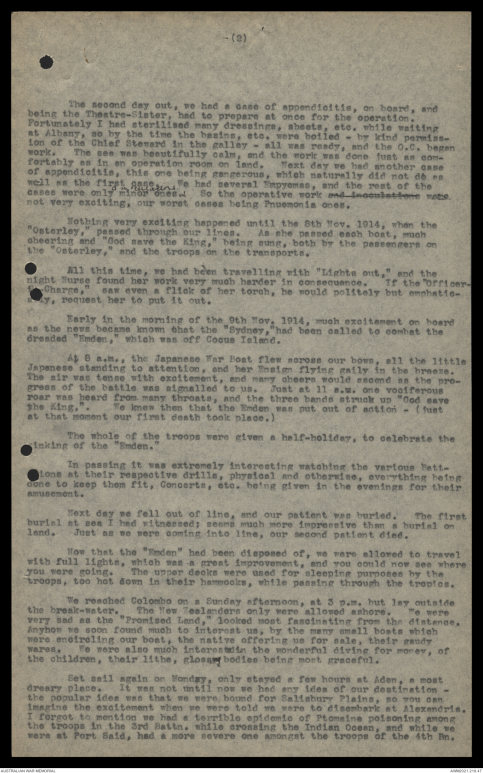
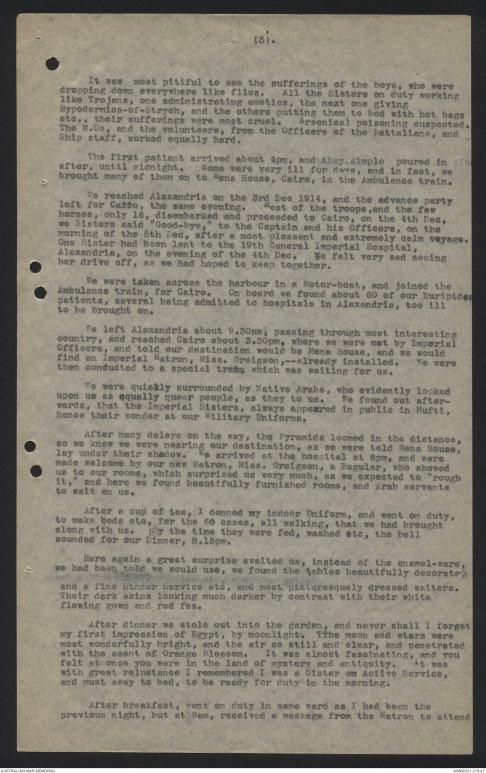
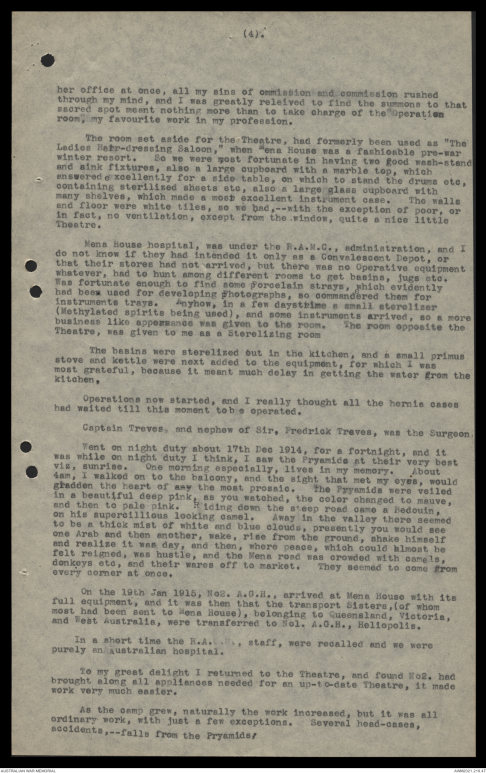
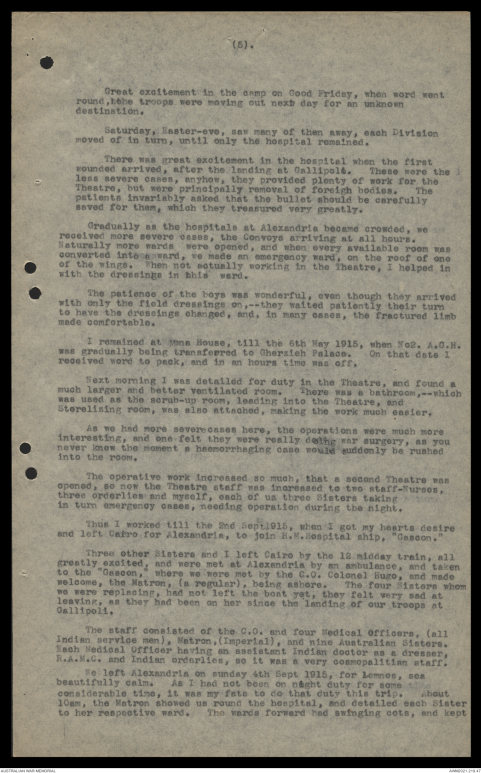
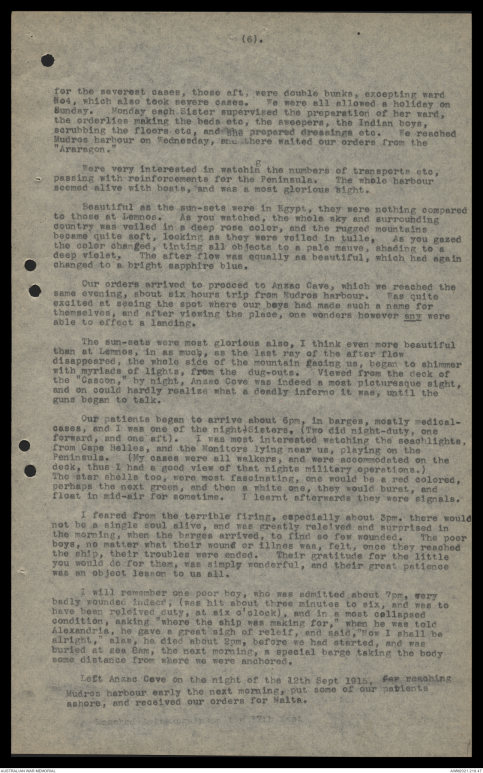
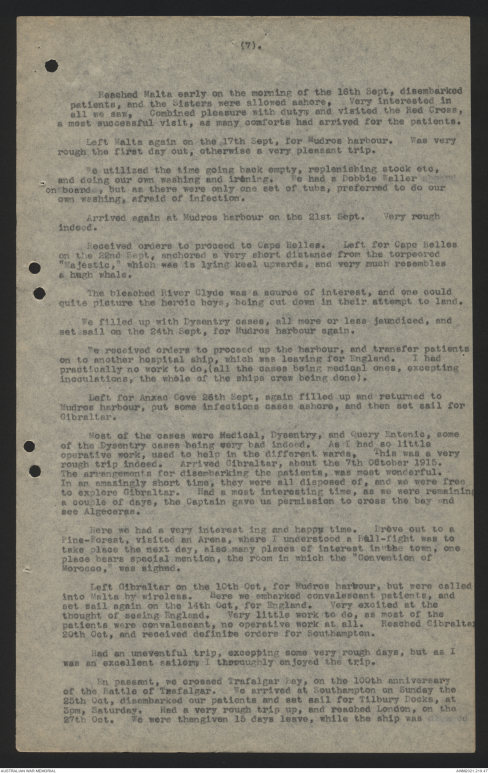
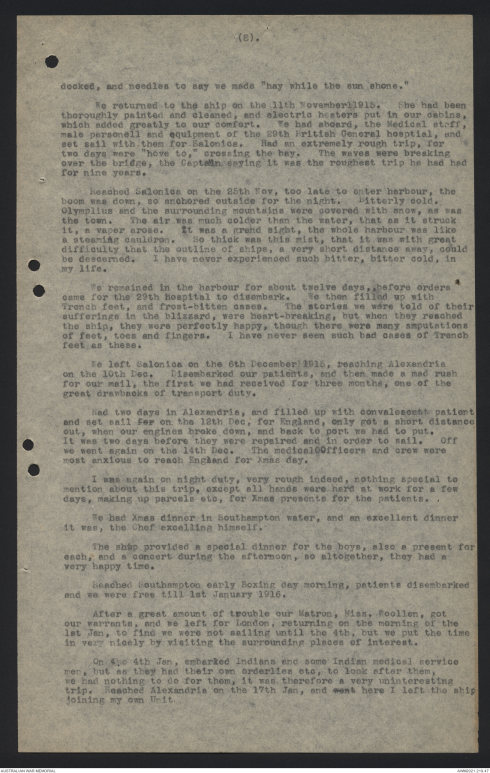
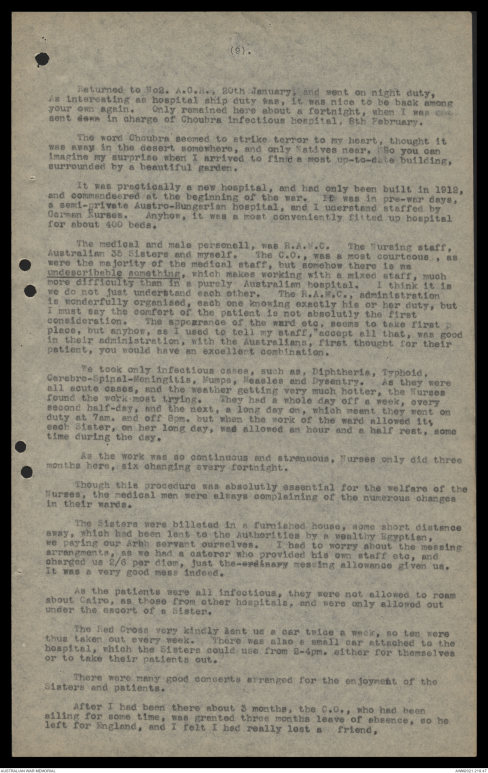
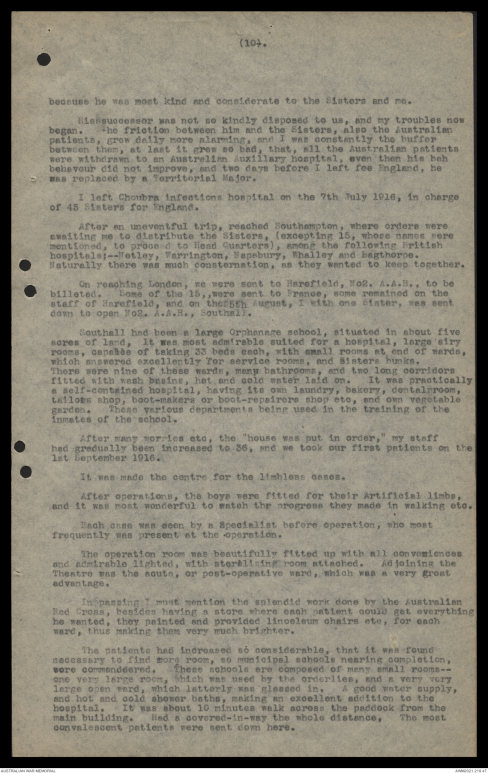
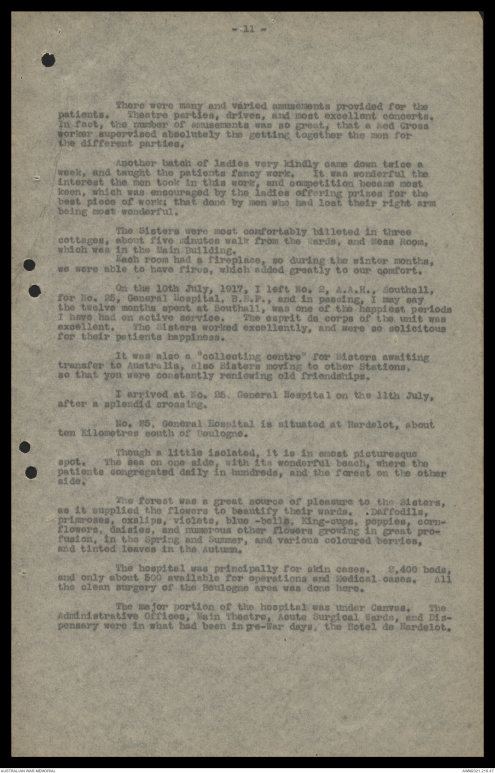
(2).
The second day out, we had a case of appendicitis, on board, and
being the Theatre-Sister, had to prepare at once for the operation.
Fortunately I had sterilised many dressings, sheets, etc. while waiting
at Albany, so by the time the basins, etc. were boiled - by kind permission
of the Chief Steward in the galley - all was ready, and the O.C. began
work. The sea was beautifully calm, and the work was done just as comfortably
as in an operation room on land. Next day we had another case
of appendicitis, this one being gangerous, which naturally did not do as
well as the first case. We had several Empyemas, and the rest of the
cases were only ^ relatively minor ones. So the operative work and inoculations was
not very exciting, our worst cases being Pnuemonia ones.
Nothing very exciting happened until the 8th Nov. 1914, when the
"Osterley," passed through our lines. As she passed each boat, much
cheering and "God save the King," being sung, both by the passengers on
the "Osterley," and the troops on the transports.
All this time, we had been travelling with "Lights out," and the
night Nurse found her work very much harder in consequence. If the "Officer-in-Charge,"
saw even a flick of her torch, he would politely but emphatically, request her to put it out.
Early in the morning of the 9th Nov. 1914, much excitement on board
as the news became known that the "Sydney," had been called to combat the
dreaded "Emden," which was off Cocus Island.
At 8 a.m., the Japanese War Boat flew across our bows, all the little
Japanese standing in attention, and her Ensign flying gaily in the breeze.
The air was tense with excitement, and many cheers would ascend as the progress
of the battle was signalled to us. Just at 11 a.m. one vociferous
roar was heard from many throats, and the three bands struck up "God save
the King,". We knew then that the Emden was put out of action - ( just
at that moment our first death took place.)
The whole of the troops were given a half-holiday, to celebrate the
sinking of the "Emden."
In passing it was extremely interesting watching the various Battalions
at their respective drills, physical and otherwise, everything being
done to keep them fit, Concerts, etc. being given in the evenings for their
amusement.
Next day we fell out of line, and our patient was buried. The first
burial at sea I had witnessed; seems much more impressive than a burial on
land. Just as we were coming into line, our second patient died.
Now that the "Emden" had been disposed of, we were allowed to travel
with full lights, which was a great improvement, and you could now see where
you were going. The upper decks were used for sleeping purposes by the
troops, too hot down in their hammocks, while passing through the tropics.
We reached Colombo on a Sunday afternoon, at 3 p.m. but lay outside
the break-water. The New Zealanders only were allowed ashore. We were
very sad as the "Promised Land," looked most fascinating from the distance.
Anyhow we soon found much to interest us, by the many small boats which
were encircling our boat, the native offering us for sale, their gaudy
wares. We were also much interestedin the wonderful diving for money, of
the children, their lithe, glossy bodies being most graceful.
Set sail again on Monday, only stayed a few hours at Aden, a most
dreary place. It was not until now we had any idea of our destination -
the popular idea was that we were bound for Salisbury Plains, so you can
imagine the excitement when we were told we were to disembark at Alexandria.
I forgot to mention we had a terrible epidemic of Ptomaine poisoning among
the troops in the 3rd Battn. while crossing the Indian Ocean, and while we
were at Fort Said, had a more severe one amongst the troops of the 4th Bn.
(3).
It was most pitiful to see the sufferings of the boys, who were
dropping down everywhere like flies. All the Sisters on duty working
like Trojans, one administrating emetics, the next one giving
Hypodermics-of-Strych, and the others putting them to bed with hot bags
etc., their sufferings were most cruel. Arsenical poisoning suspected.
The M.Os, and the volunteers, from the Officers of the Battalians, and
Ship staff, worked equally hard.
The first patient arrived about 4pm, and they simple poured in
after, until midnight. Some were very ill for days, and in fact, we
brought many of them on to Mena House, Cairo, in the Ambulance train.
We reached Alexandria on the 3rd Dec 1914, and the advance party
left for Cairo, the same evening. Most of the troops ,and the few
horses, only 16, disembarked and proceeded to Cairo, on the 4th Dec,
we Sisters said "Good-bye," to the Captain and his Officers, on the
morning of the 5th Dec, after a most pleasant and extremely calm voyage.
One Sister had been lent to the 19th General Imperial Hospital,
Alexandria, on the evening of the 4th Dec. We felt very sad seeing
her drive off, as we had hoped to keep together.
We were taken across the harbour in a Motor-boat, and joined the
Ambulance train, for Cairo. On board we found about 60 of our Euripides
patients, several being admitted to hospitals in Alexandria, too ill
to be brought on.
We left Alexandria about 9.30am, passing through most interesting
country, and reached Cairo about 3.30pm, where we were met by Imperial
Officers, and told our destination would be Mena House, and we would
find an Imperial Matron, Miss. Greigson,--already installed. We were
then conducted to a special train, which was waiting for us.
We were quickly surrounded by Native Arabs, who evidently looked
upon us as equally queer people, as they to us. We found out afterwards,
that the Imperial Sisters, always appeared in public in Mufti,
hence their wonder at our Military Uniforms.
After many delays on the way, the Pyramids loomed in the distance,
so we knew we were nearing our destination, as we were told Mena House,
lay under their shadow. We arrived at the hospital at 6pm, and were
made welcome by our new Matron, Miss. Greigson, a Regular, who showed
us to our rooms, which surprised us very much, as we expected to "rough
it," and here we found beautifully furnished rooms, and Arab servants
to wait on us.
After a cup of tea, I donned my indoor Uniform, and went on duty,
to make beds etc, for the 60 cases, all walking, that we had brought
along with us. By the time they were fed, washed etc, the bell
sounded for our Dinner, 8.15pm.
Here again a great surprise awaited us, instead of the enamel-ware,
we had been told we would use, we found the tables beautifully decorated
and a fine Dinner Service etc, and most picturesquely dressed waiters.
Their dark skins looking much darker by contrast with their white
flowing gown and red fez.
After dinner we stole out into the garden, and never shall I forget
my first impression of Egypt, by moonlight. Tthe moon and stars were
most wonderfully bright, and the air so still and clear, and penetrated
with the scent of Orange Blossom. It was almost fascinating, and you
felt at once you were in the land of mystery and antiquity. It was
with great reluctance I remembered I was a Sister on Active Service,
and must away to bed, to be ready for duty in the morning.
After breakfast, went on duty in same ward as I had been the
previous night, but at 9am, received a message from the Matron to attend
(4).
her office at once, all my sins of ommission and commission rushed
through my mind, and I was greatly relieved to find the summons to that
sacred spot meant nothing more than to take charge of the "Operation
room", my favourite work in my profession.
The room set aside for the Theatre, had formerly been used as "The
Ladies Hair-dressing Saloon," when Mena House was a fashionable pre-war
winter resort. So we were fortunate in having two good washstand
and sink fixtures, also a large cupboard with a marble top, which
answered excellently for a side table, on which to stand the drums etc,
containing sterilized sheets etc, also a large glass cupboard with
many shelves, which made a most excellent instrument case. The walls
and floor were white tiles, so we had,--with the exception of poor, or
in fact, no ventilation, except from the window, quite a nice little
Theatre.
Mena House hospital, was under the R.A.M.C., administration, and I
do not know if they had intended it only as a Convalescent Depot, or
that their stores had not arrived, but there was no Operative equipment
whatever, had to hunt among different rooms to get basins, jugs etc.
Was fortunate enough to find some porcelain strays, which evidently
had been used for developing photographs, so commandered them for
instrument trays. Anyhow, in a few daystrime a small sterelizer
(Methylated spirits being used), and some instruments arrived, so a more
business like appearance was given to the room. The room opposite the
Theatre, was given to me as a Sterelizing room
The basins were sterelized out in the kitchen, and a small primus
stove and kettle were next added to the equipment, for which I was
most grateful, because it meant much delay in getting the water from the
kitchen.
Operations now started, and I really thought all the hernia cases
had waited till this moment to b e operated.
Captain Treves, and nephew of Sir, Francis Traves, was the Surgeon.
Went on night duty about 17th Dec 1914, for a fortnight, and it
was while on night duty I think, I saw the Pryamids at their very best
viz, sunrise. One morning especially, lives in my memory. About
4am, I walked on to the balcony, and the sight that met my eyes, would
gladden the heart of any the most prosaic. The Pyyamids were veiled
in a beautiful deep pink, as you watched, the color changed to mauve,
and then to pale pink. Riding down the steep road came a Bedouin,
on his supercillious looking camel. Away in the valley there seemed
to be a thick mist of white and blue clouds, presently you would see
one Arab and then another, wake, rise from the ground, shake himself
and realize it was day, and then, where peace, which could almost be
felt reigned, was hustle, and the Mena road was crowded with camels,
donkeys etc, and their wares off to market. They seemed to come from
every corner at once.
On the 19th Jan 1915, No2. A.G.H., arrived at Mena House with its
full equipment, and it was then that the transport Sisters, (of whom
most had been sent to Mena House), belonging to Queensland, Victoria,
and West Australia, were transferred to No1. A.G.H., Heliopolis.
In a short time the R.A.G.H., staff, were recalled and we were
purely an Australian hospital.
To my great delight I returned to the Theatre, and found No2. had
brought along all appliances needed for an up-to-date Theatre, it made
work very much easier.
As the camp grew, naturally the work increased, but it was all
ordinary work, with just a few exceptions. Several head-cases,
accidents,--falls from the Pryamids;'
(5).
Great excitement in the camp on Good Friday, when word went
round, tthe troops were moving out next day for an unknown
destination.
Saturday, Easter-eve, saw many of then away, each Division
moved off in turn, until only the hospital remained.
There was great excitement in the hospital when the first
wounded arrived, after the landing at Gallipoli. These were the
less severe cases, anyhow, they provided plenty of work for the
Theatre, but were principally removal of foreign bodies. The
patients invariably asked that the bullet should be carefully
saved for them, which they treasured very greatly.
Gradually as the hospitals at Alexandria became crowded, we
received more severe cases, the Convoys arriving at all hours.
Naturally more wards were opened, and when every available room was
converted into a ward, we made an emergency ward, on the roof of one
of the wings. When not actually working in the Theatre, I helped in
with the dressings in this ward.
The patience of the boys was wonderful, even though they arrived
with only the field dressings on,--they waited patiently their turn
to have the dressings changed, and, in many cases, the fractured limb
made comfortable.
I remained at Mena House, till the 6th May 1915, when No2. A.G.H.
was gradually being transferred to Gherzieh Palace. On that date I
received word to pack, and in an hours time was off.
Next morning I was detailed for duty in the Theatre, and found a
much larger and better ventilated room. There was a bathroom,--which
was used as the scrub-up room, leading into the Theatre, and
Sterelizing room, was also attached, making the work much easier.
As we had more severe cases here, the operations were much more
interesting, and one felt they were really doing war surgery, as you
never knew the moment a haemorrhaging case would suddenly be rushed
into the room.
The operative work increased so much, that a second Theatre was
opened, so now the Theatre staff was increased to two staff-Nurses,
three orderlies and myself, each of us three Sisters taking
in turn emergency cases, needing operation during the night.
Thus I worked till the 2nd Sept 1915, when I got my hearts desire
and left Cairo for Alexandria, to join H.M. Hospital ship, "Gascon."
Three other Sisters and I left Cairo by the 12 midday train, all
greatly excited, and were met at Alexandria by an ambulance, and taken
to the "Gascon," where we were met by the C.O. Colonel Hugo, and made
welcome, the Matron, (a regular), being ashore. The four Sisters whom
we were replacing, had not left the boat yet, they felt very sad at
leaving, as they had been on her since the landing of our troops at
Gallipoli.
The staff consisted of the C.O. and four Medical Officers, (all
Indian service men), Matron, (Imperial), and nine Australian Sisters.
Each Medical Officer having an assistant Indian doctor as a dresser,
R.A.M.C. and Indian orderlies, so it was a very cosmopalitian staff.
We left Alexandria on sunday 4th Sept 1915, for Lemnos, sea
beautifully calm. As I had not been on night duty for some
considerable time, it was my fate to do that duty this trip. About
10am, the Matron showed us round the hospital, and detailed each Sister
to her respective ward. The wards forward had swinging cots, and kept
(6).
for the severest cases, those aft, were double bunks, excepting ward
No4, which also took severe cases. We were all allowed a holiday on
Sunday. Monday each Sister supervised the preparation of her ward,
the orderlies making the beds etc, the sweepers, the Indian boys,
scrubbing the floors etc, and she prepared dressings etc. We reached
Mudros harbour on Wednesday, and there waited our orders from the
"Araragon."
Were very interested in watchin^g the numbers of transports etc,
passing with reinforcements for the Peninsula. The whole harbour
seemed alive with boats, and was a most glorious sight.
Beautiful as the sun-sets were in Egypt, they were nothing compared
to those at Lemnos. As you watched, the whole sky and surrounding
country was veiled in a deep rose color, and the rugged mountains
became quite soft, looking as they were veiled in tulle. As you gazed
the color changed, tinting all objects to a pale mauve, shading to a
deep violet. The after flow was equally as beautiful, which had again
changed to a bright sapphire blue.
Our orders arrived to proceed to Anzac Cave, which we reached the
same evening, about six hours trip from Mudros harbour. Was quite
excited at seeing the spot where our boys had made such a name for
themselves, and after viewing the place, one wonders however any were
able to effect a landing.
The sun-sets were most glorious also, I think even more beautiful
than at Lemnos, in as much, as the last ray of the after flow
disappeared, the whole side of the mountain facing us, began to shimmer
with myriads of lights, from the dug-outs. Viewed from the deck of
the "Gascon," by night, Anzac Cove was indeed a most picturesque sight,
and on could hardly realise what a deadly inferno it was, until the
guns began to talk.
Our patients began to arrive about 6pm, in barges mostly medical-cases,
and I was one of the night-Sisters. (Two did night-duty, one
forward, and one aft). I was most interested watching the seachlights,
from Cape Helles, and the Monitors lying near us, playing on the
Peninsula. (My cases were all walkers, and were accommodated on the
deck, thus I had a good view of that nights military operations.)
The star shells too, were most fascinating, one would be a red colored,
perhaps the next green, and then a white one, they would burst, and
float in mid-air for sometime. I learnt afterwards they were signals.
I feared from the terrible firing, especially about 3pm. there would
not be a single soul alive, and was greatly releived and surprised in
the morning, when the barges arrived, to find so few wounded. The poor
boys, no matter what their wound or illnes was, felt, once they reached
the ship, their troubles were ended. Their gratitude for the little
you would do for them, was simply wonderful, and their great patience
was an object lesson to us all.
I will remember one poor boy, who was admitted about 7pm, very
badly wounded indeed, (was hit about three minutes to six, and was to
have been releived duty, at six o'clock), and in a most collapsed
condition, asking "where the ship was making for," when he was told
Alexandria, he gave a great sigh of releif, and said, "Now I shall be
alright," alas, he died about 2pm, before we had started, and was
buried at sea 8am, the next morning, a special barge taking the body
some distance from where we were anchored.
Left Anzac Cove on the night of the 12th Sept 1915, for reaching
Mudros harbour early the next morning, put some of our patients
ashore, and received our orders for Malta.
(7).
Reached Malta early on the morning of the 16th Sept, disembarked
patients, and the Sisters were allowed ashore. Very interested in
all we saw. Combined pleasure with duty and visited the Red Cross,
a most successful visit, as many comforts had arrived for the patients.
Left Malta again on the 17th Sept, for Mudros harbour. Was very
rough the first day out, otherwise a very pleasant trip.
We utilized the time going back empty, replenishing stock etc,
and doing our own washing and ironing. We had a Dobbie Waller
on board, but as there were only one set of tubs, preferred to do our
own washing, afraid of infection.
Arrived again at Mudros harbour on the 21st Sept. Very rough
indeed.
Received orders to proceed to Cape Helles. Left for Cape Helles
on the 22nd Sept, anchored a very short distance from the torpeored
"Majestic," which was is lying keel upwards, and very much resembles
a hugh whale.
The bleached River Clyde was a source of interest, and one could
quite picture the heroic boys, being cut down in their attempt to land.
We filled up with Dysentry cases, all more or less jaundiced, and
set sail on the 24th Sept, for Mudros harbour again.
We received orders to proceed up the harbour, and transfer patients
on to another hospital ship, which was leaving for England. I had
practically no work to do, (all the cases being medical ones, excepting
inoculations, the whole of the ships crew being done).
Left for Anzac Cove 26th Sept, again filled up and returned to
Mudros harbour, put some infectious cases ashore, and then set sail for
Gibraltar.
Most of the cases were Medical, Dysentry, and Query Enteric, some
of the Dysentry cases being very bad indeed. As I had so little
operative work, used to help in the different wards. This was a very
rough trip indeed. Arrived Gibraltar, about the 7th October 1915.
The arrangements for disembarking the patients, was most wonderful.
In an amazingly short time, they were all disposed of, and we were free
to explore Gibraltar. Had a most interesting time, as we were remaining
a couple of days, the Captain gave us permission to cross the bay and
see Algeceras.
Here we had a very interesting and happy time. Drove out to a
Pine-Forest, visited an Arena, where I understood a Bull-fight was to
take place the next day, also many places of interest in the town, one
place bears special mention, the room in which the "Convention of
Morocco," was signed.
Left Gibraltar on the 10th Oct, for Mudros harbour, but were called
into Malta by wireless, Here we embarked convalescant patients, and
set sail again on the 14th Oct, for England. Very excited at the
thought of seeing England. Very little work to do, as most of the
patients were convalescant, no operative work at all. Reached Gibraltar
20th Oct, and received definite orders for Southampton.
Had an uneventful trip, excepting some very rough days, but as I
was an excellent sailor, I thoroughly enjoyed the trip.
En passant, we crossed Trafalgar Bay, on the 100th anniversary
of the Battle of Trafalgar. We arrived at Southampton on Sunday the
25th Oct, disembarked our patients and set sail for Tilbury Docks, at
3pm, Saturday. Had a very rough trip up, and reached London, on the
27th Oct. We were then given 15 days leave, while the ship was
(8).
docked, and needless to say we made "hay while the sun shone."
We returned to the ship on the 11th November 1915. She had been
thoroughly painted and cleaned, and electric heaters put in our cabins,
which added greatly to our comfort. We had aboard, the Medical staff,
male personell and equipment of the 29th British General hospital, and
set sail with them for Salonica. Had an extremely rough trip, for
two days were "hove to," crossing the bay. The waves were breaking
over the bridge, the Captain saying it was the roughest trip he had had
for nine years.
Reached Salonica on the 25th Nov, too late to enter harbour, the
boom was down, so anchored outside for the night. Bitterly cold.
Olymplius and the surrounding mountains were covered with snow, as was
the town. The air was much colder than the water, that as it struck
it, a vaper arose. It was a grand sight, the whole harbour was like
a steaming cauldron. So thick was the mist, that it was with great
difficulty that the outline of the ships, a very short distance away, could
be descerned. I have never experienced such bitter, bitter cold, in
my life.
We remained in the harbour for about twelve days, before orders
came for the 29th hospital to disembark. We then filled up with
Trench feet, and frost-bitten cases. The stories we were told of their
sufferings in the blizzard, were heart-breaking, but when they reached
the ship, they were perfectly happy, though there were many amputations
of feet, toes and fingers. I have never seen such bad cases of Trench
feet as these.
We left Salonica on the 6th December 1915, reaching Alexandria
on the 10th Dec. Disembarked our patients, and then made a mad rush
for our mail, the first we had received for three months, one of the
great drawbacks of transport duty.
Had two days in Alexandria, and filled up with convalescent patients
and set sail for on the 12th Dec, for England, only got a short distance
out, when our engines broke down, and back to port we had to put.
It was two days before they were repaired and in order to sail. Off
we went again on the 14th Dec. The medicalOOfficers and crew were
most anxious to reach England for Xmas day.
I was again on night duty, very rough indeed, nothing special to
mention about this trip, except all hands were hard at work for a few
days, making up parcels etc, for Xmas presents for the patients.
We had Xmas dinner in Southampton water, and an excellent dinner
it was, the Chef excelling himself.
The ship provided a special dinner for the boys, also a present for
each, and a concert during the afternoon, so altogether, they had a
very happy time.
Reached Southampton early Boxing day morning, patients disembarked
and we were free till 1st January 1916.
After a great amount of trouble our Matron, Miss. Woollen, got
our warrants, and we left for London, returning on the morning of the
1st Jan, to find we were not sailing until the 4th, but we put the time
in very nicely by visiting the surrounding places of interest.
On the 4th Jan, embarked Indians and some Indian medical service
men, but as they had their own orderlies etc, to look after them,
we had nothing to do for them, it was therefore a very uninteresting
trip. Reached Alexandria on the 17th Jan, and went here I left the ship
joining my own Unit
(9).
Returned to No2. A.G.H., 20th January, and went on night duty,
As interesting as hospital ship duty was, it was nice to be back among
your own again. Only remained here about a fortnight, when I was
sent down in charge of Choubra infectious hospital, 8th February.
The word Choubra seemed to strike terror to my heart, thought it
was away in the desert somewhere, and only Natives near. So you can
imagine my surprise when I arrived to find a most up-to-date building,
surrounded by a beautiful garden.
It was practically a new hospital, and had only been built in 1912,
and commandeered at the beginning of the war. It was in pre-war days,
a semi-private Austro-Hungarian hospital, and I uderstand staffed by
German Nurses. Anyhow, it was a most conveniently fitted up hospital
for about 400 beds.
The medical and male personell, was R.A.M.C. The Nursing staff,
Australian 35 Sisters and myself. The C.O., was a most courteous , as
were the majority of the medical staff, but somehow there is an
undescribable something, which makes working with a mixed staff, much
more difficulty than in a purely Australian hospital. I think it is
we do not just understand each other. The R.A.M.C., administration
is wonderfully organised, each one knowing exactly his or her duty, but
I must say the comfort of the patient is not absolutly the first
consideration. The appearance of the ward etc, seems to take first
place, but anyhow, as I used to tell my staff, "accept all that, was good
in their administration, with the Australians, first thought for their
patient, you would have an excellent combination.
We took only infectious cases, such as, Diptheria, Typhoid,
Cerebro-Spinal-Meningitis, Mumps, Measles and Dysentry. As they were
all acute cases, and the weather getting very much hotter, the Nurses
found the work most trying. They had a whole day off a week, every
second half-day, and the next, a long day on, which meant they went on
duty at 7am. and off 8pm. but when the work of the ward allowed it,
each Sister, on her long day, was allowed an hour and a half rest, some
time during the day.
As the work was so continuous and strenuous, Nurses only did three
months here, six changing every fortnight.
Though this procedure was absolutly essential for the welfare of the
Nurses, the medical men were always complaining of the numerous changes
in their wards.
The Sisters were billeted in a furnished house, some short distance
away, which had been lent to the Authorities by a wealthy Egyptian,
we paying our Arab servant ourselves. I had to worry about the messing
arrangments, as we had a caterer who provided his own staff etc, and
charged us 2/6 per diem, just the-ordinary messing allowance given us.
It was a very good mess indeed.
As the patients were all infectious, they were not allowed to roam
about Cairo, as those from other hospitals, and were only allowed out
under the escort of a Sister.
The Red Cross very kindly sent us a car twice a week, so ten were
thus taken out every week. There was also a small car attached to the
hospital, which the Sisters could use from 2-4pm. either for themselves
or to take their patients out.
There were many good concerts arranged for the enjoyment of the
Sisters and patients.
After I had been there about 3 months, the C.O., who had been
ailing for some time, was granted three months leave of absence, so he
left for England, and I felt I had really lost a friend.
(10).
because he was most kind and considerate to the Sisters and me.
His successor was not so kindly disposed to us, and my troubles now
began. The friction between him and the Sisters, also the Australian
patients, grew daily more alarming, and I was constantly the buffer
between them, at last it grew so bad, that, all the Australian patients
were withdrawn to an Australian Auxillary hospital, even then his beh
behaviour did not improve, and two days before I left fee England, he
was replaced by a Territorial Major.
I left Choubra infections hospital on the 7th July 1916, in charge
of 45 Sisters for England.
After an uneventful trip, reached Southampton, where orders were
awaiting me to distribute the Sisters, (excepting 15, whose names were
mentioned, to proceed to Head Quarters), among the following British
hospitals;--Hetley, Warrington, Napsbury, Whalley, and Bagthorpe.
Naturally there was much consternation, as they wanted to keep together.
On reaching London, we were sent to Harefield, No 2. A.A.H. to be
billeted. Some of the 15, , were sent to France, some remained on the
staff at Harefield, and on the 5th August, I with one Sister , was sent
down to open No2. A.A.H., Southall.
Southall had been a large Orphanage school, situated in about five
acres of land, It was most admirable suited for a hospital, large airy
rooms, capable of taking 33 beds each, with small rooms at end of wards,
which answered excellently for service rooms, and Sisters bunks.
There were nine of these wards, many bathrooms, and two long corridors
fitted with wash basins, hot and cold water laid on. It was practically
a self contained hospital, having its own laundry, bakery, dental room,
tailors shop, boot-makers or boot-repairers shop etc, and own vegetable
garden. These various departments being used in the training of the
inmates of the school.
After many worries etc, the "house was put in order," my staff
had gradually been increased to 36, and we took our first patients on the
1st September 1916.
It was made the centre for the limbless cases.
After operations, the boys were fitted for their Artificial limbs,
and it was most wonderful to watch the progress they made in walking etc.
Each case was seen by a specialist before operation, who most
frequently was present at the operation.
The operation room was beautifully fitted up with all conveniences
and admirable lighted, with sterilizing room attached. Adjoining the
Theatre was the acute, or post-operative ward, which was a very great
advantage.
In passing I must mention the splendid work done by the Australian
Red Cross, besides leaving a store where each patient could get everything
he wanted, they painted and provided linoleum chairs etc. for each
ward, thus making them very much brighter.
The patients had increased so considerable, that it was found
necessary to find more room, so municipal schools nearing completion,
were commandeered. These schools are composed of many small rooms--
one very large room, which was used by the orderlies, and a very very
large open ward, which latterly was glassed in. A good water supply,
and hot and cold shower baths, making an excellent addition to the
hospital. It was about 10 minutes walk across the paddock from the
main building. Had a covered-in-way the whole distance. The most
convalescent patients were sent from here.
- 11 -
There were many and varied amusements provided for the
patients. Theatre parties, drives, and most excellent concerts.
In fact, the number of amusements were so great, that a Red Cross
worker supervised absolutely the getting together the men for
the different parties.
Another batch of ladies very kindly came down twice a
week, and taught the patients fancy work. It was wonderful the
interest the men took in this work, and competition became most
keen, which was encouraged by the ladies offering prizes for the
best piece of work; that done by men who had lost their right arm
being most wonderful.
The Sisters were most comfortably billeted in three
cottages, about five minutes walk from the Wards, and Mess Room,
which was in the Main Building.
Each room had a fireplace, so during the winter months,
we were able to have fires, which added greatly to our comfort.
On the 10th July, 1917, I left No. 2 A.A.H., Southall,
for No. 25 General Hospital, B.E.F., and in passing, I may say
the twelve months spent in Southall, was one of the happiest periods
I have had on active service. The esprit de corps of the unit was
excellent. The Sisters worked excellently, and were so solicitous
for their patients happiness.
It was also a "collecting centre" for Sisters awaiting
transfer to Australia, also Sisters moving to other Stations,
so that you were constantly reniewing old friendships.
I arrived at No. 25 General Hospital on the 11th July,
after a splendid crossing.
No. 25 General Hospital is situated in Hardelot, about
ten Kilometres south of Boulogne.
Though a little isolated, it is in most picturesque
spot. The sea on one side, with its wonderful beach, where the
patients congregated daily in hundreds, and the forest on the other
side.
The forest was a great source of pleasure to the Sisters,
as it supplied the flowers to beautify the wards. Daffodils,
primroses, oxalips, violets, blue -bells, King-cups, poppies, cornflowers,
daisies, and numerous other flowers growing in great profusion,
in the Spring and Summer, and various coloured berries,
and tinted leaves in the Autumn.
The Hospital was principally for skin cases, 2,400 beds,
and only about 500 available for operations and Medical cases. All
the clean surgery of the Boulogne area was done here.
The major portion of the hospital was under Canvas. The
Administrative Offices, Main Theatre, Acute Surgical Wards, and Dispensary
were in what had been in pre-War days, the Hotel de Hardelot.
 Sandy Mudie
Sandy MudieThis transcription item is now locked to you for editing. To release the lock either Save your changes or Cancel.
This lock will be automatically released after 60 minutes of inactivity.